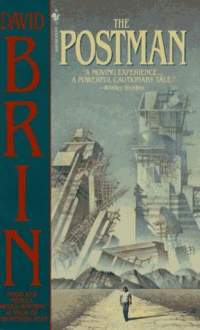Existence by David Brin
 Monday, June 18, 2012 at 6:49PM
Monday, June 18, 2012 at 6:49PM 
Published by Tor Books on June 19, 2012
Could there be a more ambitious title than Existence? David Brin earns forgiveness for his hubris by pulling off a dazzling exploration of humanity's response to the inevitable end of everything -- a redefinition of human existence. No small story, Existence strives for epic status. It is far-reaching, thought-provoking, and above all, entertaining. Existence is an idea-driven novel that doesn't skimp on plot or interesting characters. The story -- structured as a tapestry of interwoven plot threads -- changes directions more often than a miniature golf course. Since no summary could do it justice, a quick identification of the threads will have to suffice.
Operating a long bola tethered to a space station, Gerald Livingstone grabs orbiting space debris before it can cause any damage. After snatching a puzzling object from orbit, Gerald eventually realizes that it is a communication device, an alien emissary. Understanding what its many voices are trying to communicate becomes a daunting task that captivates the world's imagination. Peng Xiang Bin, collector of salvage in flooded Shanghai, finds a submerged object that closely resembles the orbiting artifact. Intriguingly, the "worldstone" is communicating a different message than its orbiting rival.
Hacker, the playboy heir to a fortune whose hobbies include amateur rocketry, befriends some unusual dolphins after his reentry vehicle crashes. Hacker's mother, Lacey, is a member of the powerful clade that exerts influence over nearly everything. Tech-bashing apocalyptic novelist Hamish Brookeman is a proponent of the Renunciation Movement, which wants to slow the development of technology until wisdom catches up. A reporter named Tor Povlov is on the verge of becoming a media star when a life-altering experience forces her to change the way she investigates and reports. More than the others, her storyline showcases the Information Age on steroids.
Eventually all of these plotlines (and others that are late-blooming) come together, although sometimes only loosely. Most of the story takes place on Earth but space junkies will be happy with the final 150 pages. Scattered chapter breaks provide information that adds texture to the narrative. The most salient of these are excerpts from Pandora's Cornucopia, which examines and catalogs threats to human existence. Add to this mix a sort of freeform autistic poetry that makes copious use of +/- symbols and you get a sense of the diverse and varied ideas and writing styles that Brin incorporates into the novel.
Although much of Brin's future is familiar -- eyewear that reveals or blocks a wide array of virtual inputs, evolving AIs, a Balkanized America -- he treats the reader to fresh ideas: a worldwide autism plague, homesteaders rebuilding cities that are buried underwater, public urination as a way to recycle phosphorus, self-righteous indignation (the enemy of reason) as a brain-altering addiction ... and more. Fans of knowledge will enjoy the discussions of ancient history, political theory, gene-splicing, brain chemistry, and the Fermi paradox, while science fiction fans will appreciate Brin's references to classic works in the genre.
Thankfully, Brin doesn't feel the need to describe every aspect of his imagined future in painstaking detail. Brin has the self-discipline to integrate information into the story, avoiding the pace-deadening exposition that mars the work of more self-indulgent writers. Brin skillfully blends his wealth of ideas with the necessities of good storytelling: an entertaining, carefully constructed plot and believable (if not always multidimensional) characters.
While Brin leavens the plot with humor and action scenes, the novel raises profound questions about the nature of existence -- how long humanity will endure, how it will end, how the definition of "human" will change, and what the human race is prepared to do to make its collective life last. Perhaps Brin's point lies in a quotation from Jamais Cascio that appears in the text: "in bad times, pessimism is a self-fulfilling and fatal prophecy." Or perhaps the point lies in a quotation from Darwin about the impossibility of understanding the "complex contingencies" on which existence depends.
Much like the world of the present, Brin's future is filled with sincere people who are frantic to save the planet while arguing about the nature of threats and proposed solutions, thus exacerbating the problems they seek to correct. Yet I was impressed by the sense of balance and optimism that pervades Existence. Brin pokes fun at prophets of doom while recognizing the need for cautionary voices. He is respectful of scientific achievement while acknowledging the reality that technological advancements often outstrip mankind's ability to use them wisely.
The true nature and purpose of the communication devices makes Existence one of the most imaginative first contact stories I've encountered. Existence is a little messy, as you would expect a novel of this length to be, and it drags in spots, although not often. If it doesn't quite succeed in its ambition, if the various plot threads don't perfectly cohere, if some of the characters are a bit underdeveloped, Brin nonetheless deserves credit for accomplishing so much in this intriguing and captivating novel.
RECOMMENDED
